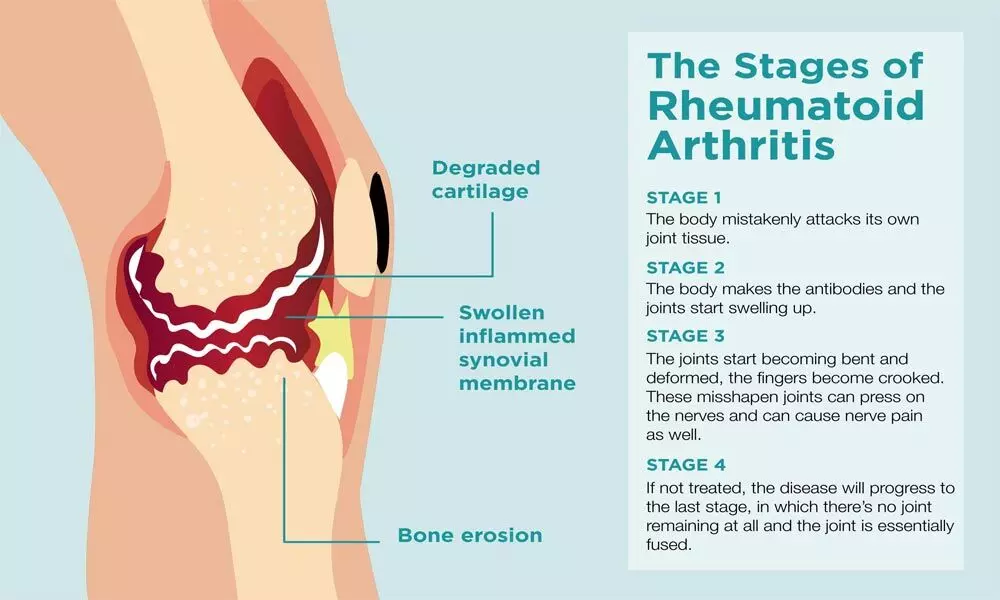What is Rheumatoid Arthritis
 What is Rheumatoid Arthritis
What is Rheumatoid ArthritisRheumatoid arthritis, commonly known in Hindi as "Gatiya", is a disease of our own dysfunctional immune system. When I say dysfunctional immune system, it means that our own body and immune system which is meant to protect us from other infections and foreign invaders, starts attacking us back.
Rheumatoid arthritis, commonly known in Hindi as "Gatiya", is a disease of our own dysfunctional immune system. When I say dysfunctional immune system, it means that our own body and immune system which is meant to protect us from other infections and foreign invaders, starts attacking us back.
One percent of India's population has rheumatoid arthritis. Considering a large number of population we have, if we calculate almost 10 lac people are affected by it.
People often have this conception that it is the disease of the elderly and we as a young individual should not be having it. To broadly identify it, we have two types of arthritis. One is the age related one known as Osteoarthritis where there is more of wear and tear of cartilage. Osteoarthritis is a disease of the elderly.
The other arthritis is the inflammatory arthritis, which has fifty different variants with Rheumatoid arthritis being one of them. Rheumatoid arthritis affects most of the people in the younger age group between 20-40 and is more common in the girls. Arthritis in itself can affect the children as young as 6 months of age, known as Juvenile Idiopathic arthritis. So it doesn't really spare any age group.
But it is very important to be aware of the signs and symptoms of the disease. Only then you can approach your Rheumatologist early and help in arresting the disease at an early stage. One of the first signs is pain and stiffness in the hand joints (wrist, knuckles) and foot joints. One very peculiar feature of this arthritis is the early morning stiffness. You feel the hands and body are stiff in the mornings and takes you more than 30-45 minutes to get back to daily routine.
The stiffness goes down as day passes only to worsen at night again. And this is the exact time we should intervene and halt the disease . Eventually within 4-6 weeks of these symptoms you will start experiencing the swelling of the joints and progression to the large joints like knees, shoulders, elbows. Those are the early signs that the disease has progressed. All the new data points towards early control of disease, within six months of onset. People who start treatment late have more intake of pain killers and higher chances of joint damage. Rheumatoid arthritis does not limit to the joints only. It can affect lungs, kidneys, eyes as well.
Coming to the most important aspect is the treatment. There have been a lot of advances in the recent years but we still havnt been able to find the ultimate cure for it. One of the main goals which has changed over years is to use almost negligible pain killers and minimum steroids. We prefer avoiding steroids in our prescription. The drugs are divided into DMARDS and Biological DMARDS. 90 percent will respond to the traditional old DMARD Drugs (Methotrexate, LEflunomide, Hydroxychloroquine and Sulphasalzine) while 10 percent with aggressive disease may need the help of the Biological drugs.
As with alternative medicines, I will not comment much but to my experience it doesn't really help patients with moderate to severe disease and we end up losing crucial time to control the disease. Patients with mild disease may benefit a little from it. Ultimate goal remains to minimize the damage caused to the joints, provide good quality of life and avoidance of pain killers and steroids.
Apart from the medications, lifestyle modifications are very much needed to keep the disease at bay. Make sure you exercise daily for 20-30 minutes, avoid smoking and eathygienic food which should be well cooked. stress has been found to be a major culprit in triggering autoimmune diseases. We should learn the art of stress coping strategies to lead a well nurtured balanced life.

